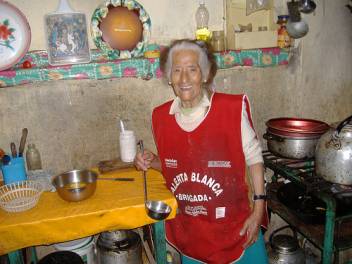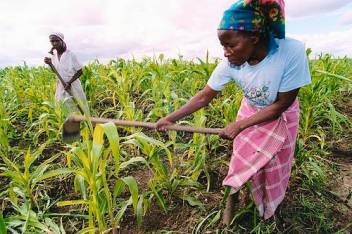This International Day for Disaster Reduction (IDDR), I was thinking how much HelpAge’s work on disaster risk reduction has expanded over the past few years. Our work in communities to help older people respond to disasters is much better understood throughout HelpAge and by our partners and also highlights the invaluable contributions older people make in disasters.
This year’s focus for IDDR is “Women and Girls – the [in]Visible Force of Disaster Resilience”. This is particularly relevant to HelpAge’s experience of the specific vulnerabilities, and most importantly, the unique contributions older women make to building resilience.
White Brigades in Bolivia
 An example of this is our work in Bolivia, where older people are learning new skills and are an asset in emergency responses.
An example of this is our work in Bolivia, where older people are learning new skills and are an asset in emergency responses.
In Bolivia, we train “Brigades Blancas” (self-named “White Brigades” due to their white hair!) in prevention and disaster action planning so they can support their communities in future emergencies. They also register and identify vulnerable older people, recognise threats and risks and participate in drills and emergency responses.
Nora Aliaga, 65, is the leader of a “White Brigade” and works selling soft drinks at mineral loading mines north of La Paz. In February 2011, a large landslide destroyed 1,700 homes in La Paz and affected 5,000 people.
Nora said: “When the landslide happened we didn’t know what to do. But now we are trained we know how to act when such a disaster happens again. We learned to look out for the signs of a disaster. We look at where a house is cracked and if the cracks are moving. If so, we know we have to evacuate, contact the other White Brigades and the police.”
Disaster committees in Jamaica
In Jamaica, HelpAge is supporting vulnerable communities to manage the risks associated with hurricanes and floods in ten communities across St Catherine. These communities have learnt about community mobilisation and disaster risk management plans, with older women at the centre of the activities.
We are also working with these communities to ensure older people can earn an income even in emergency situations. We are training farmers in financial management and setting up a community disaster fund to minimise the financial challenges faced by farmers in the event of a disaster.
The farmers, many of which are women, who took part in this project, are often responsible for providing most of the food for their households. They will learn how to create barriers for fields on high lands to reduce their vulnerability to landslides.
Older women farmers central to resilience
 Central to disaster risk reduction are resilient livelihoods and food security systems. There is growing evidence from countries in the developing world that farm workforces are ageing and a significant proportion of older farmers are women.
Central to disaster risk reduction are resilient livelihoods and food security systems. There is growing evidence from countries in the developing world that farm workforces are ageing and a significant proportion of older farmers are women.
Older women play a full part in agricultural production in developing countries but face many challenges. Exclusion from training is a common experience.
Yet where older women have the chance to benefit from agricultural training they are eager to take it. Older women in Africa, affected by the high incidence of illness and deaths from HIV and AIDS among those of “working age”, can be both producers and carers.
As a result, older people in western Kenya, for instance, have reported that their harvest yields and food consumption are much lower due to conflicting priorities with their role as carers. Older women therefore must be central to all strategies if resilient agriculture and food security are to be achieved.
Invisible force of resilience
From forming White Brigades in Bolivia to building community emergency teams in Jamaica, HelpAge’s risk reduction and resilience building work is ensuring that older men and women’s vulnerabilities are not only addressed, but that their knowledge and contributions are recognised, harnessed and do not remain invisible.
Find out more about our work with older people in emergencies.
